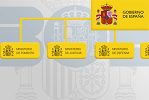Working hours, leave and holidays
Content
Introduction
The law establishes conditions and limits and the regulations apply these.
They may be specified in collective agreements![]() .
.
Working hours
These issues are regulated in Article 34 of the Workers’ Statute![]() .
.
The following issues are also set out in the Labour Guide:![]()
-
Duration established in collective agreement: Maximum of 40 hours of effective work (weekly average in one year).
-
Rest period between one working day and the next: 12 hours.
-
Maximum of normal working hours per day: 9 hours.
-
After 6 hours of continuous work, you must take a break of 15 minutes.
-
There are limits that afford greater protection for workers between 16 and 18 years of age.
-
Working hours can be distributed on an irregular basis pursuant to the collective agreement.
-
The company must keep a daily record of hours worked.
-
There are adaptations for certain activities. See Royal Decree 1561/1995 of 21 September on special working hours
 .
. -
Adaptations are also possible to ensure a family-work life balance.
-
There are stricter rules for night work and shift work ( Article 36 of the Workers’ Statute
 ).
).
Overtime
These issues are regulated in Article 35 of the Workers’ Statute![]() .
.
They are also set out in the Labour Guide![]() .
.
-
This is working time that exceeds normal working hours.
-
It is voluntary, except if a collective agreement exists.
-
It is compensated for either in the pay cheque (at least as normal working hours) or by rest periods over the next 4 months.
-
Maximum of 80 hours a year.
-
Time spent working to prevent or remedy incidents and other extraordinary and urgent damage is not considered overtime.
-
The daily record of hours worked is used to calculate it. It will be reflected in the payslip.
Paid leave
These issues are regulated in Article 37 of the Workers’ Statute![]() .
.
The following issues are also set out in the Labour Guide![]() :
:
-
Weekly rest: one day and a half, which may be accumulated over a period of 14 days.
-
Public holidays: 14 a year. Paid and non-recoverable.
- Paid leave, absence from work, with prior notice and justification, for specific reasons.
- Marriage or civil partnership: 15 days.
- Accident, serious illness, hospitalisation or surgery without hospitalisation with recovery at home of a spouse, unmarried partner or relative up to the second degree or cohabiting person: 5 days
- Death of a spouse, unmarried partner or relative up to the second degree: 2 days (4 days if travel required).
- Moving house: 1 day.
- Time required to fulfil public and personal duties from which the worker cannot be excused.
- Performing statutory and contractual trade union duties.
- Prenatal check-ups and preparing for childbirth. Information sessions and preparing for adoption, guardianship with a view to adoption or fostering. Undertaking compulsory psychological and social assessments for the declaration of suitability. As necessary.
- If it is not possible to access the workplace due to recommendations, restrictions or prohibitions issued by the competent authority or in the event of a serious and imminent risk: up to four days, which may be extended if the circumstances continue.
- The time needed during the work day to prepare for organ or tissue donation.
Annual holidays
These issues are regulated in Article 38 of the Workers’ Statute![]() .
.
The following issues are also set out in the Labour Guide![]() :
:
-
The annual paid holiday period, which may not be replaced by economic compensation, will be no less than 30 calendar days.
-
The holiday period or periods will be established based on mutual agreement between the employer and the employee.
Temporary incapacity
This is a situation in which a worker is temporarily unable to work due to a common or occupational disease or an accident, whether or not work-related, while they receive medical care covered by the Social Security system.
Situations that are also considered determining factors in temporary incapacity include observation periods due to occupational diseases in which the worker is declared unfit to work.
Information about this benefit (beneficiaries, requirements, amount, duration, causes for cancellation, processing and documents, etc.) is set out in the Labour Guide![]() and on the Social Security website
and on the Social Security website![]() .
.
Medical examinations
Medical examinations, pursuant to Article 22 of Law 31/1995, on occupational risk prevention![]() : Regular monitoring of workers’ health, depending on the risks involved in their jobs, is mandatory for the employer and must be performed at the employer's cost.
: Regular monitoring of workers’ health, depending on the risks involved in their jobs, is mandatory for the employer and must be performed at the employer's cost.
Información por Comunidades Autónomas






Andalucía Aragón Asturias, Principado de Balears, Illes Canarias Cantabria Castilla y León Castilla-La Mancha Cataluña Ciudad de Ceuta Ciudad de Melilla Comunitat Valenciana Extremadura Galicia Madrid, Comunidad de Murcia, Región de Navarra, Comunidad Foral de País Vasco Rioja, La
Legal and/or technical references
-
Royal Legislative Decree 2/2015 of 23 October approving the recast text of the Workers’ Statute

-
Labour Guide

-
Royal Decree 1561/1995 of 21 September on special working hours

-
Search engine for state collective agreements

-
Search engine for regional government collective agreements

-
Law 31/95 on the Prevention of Occupational Risks











